
Clean Technologies and Environmental Policy
Scope & Guideline
Leading the charge for sustainable practices and policies.
Introduction
Aims and Scopes
- Sustainable Waste Management:
Research on innovative methods for managing waste, including recycling, upcycling, and waste-to-energy technologies, with an emphasis on minimizing environmental impact. - Renewable Energy Solutions:
Exploration of renewable energy technologies, including solar, wind, and biogas systems, focusing on their efficiency, economic viability, and integration into existing energy systems. - Environmental Policy and Governance:
Analysis of the effectiveness of environmental policies and regulations, assessing their impact on sustainability practices across various sectors and regions. - Eco-Innovation and Green Technologies:
Investigation into new technologies and processes that promote sustainability, including the development of eco-friendly materials, biotechnologies, and energy-efficient systems. - Life Cycle Assessment (LCA):
Application of LCA methodologies to evaluate the environmental impacts of products, processes, and technologies, promoting a comprehensive understanding of sustainability. - Climate Change Mitigation Strategies:
Research on strategies to mitigate climate change impacts through technological innovation, policy frameworks, and stakeholder engagement.
Trending and Emerging
- Circular Economy Practices:
An increasing focus on circular economy principles, emphasizing the importance of resource recovery, waste minimization, and sustainable production practices. - Green Finance and Investment:
Emerging research on the role of green finance in promoting sustainable technologies and practices, including investment strategies that align with environmental objectives. - Digitalization in Environmental Management:
The integration of digital technologies, such as AI and big data analytics, into environmental management practices is gaining traction, with studies exploring their potential for enhancing sustainability. - Sustainable Agriculture Innovations:
Research on sustainable agricultural practices and technologies is on the rise, addressing the need for environmentally friendly methods to increase food security. - Energy Transition and Decarbonization:
A strong emphasis on strategies for transitioning to low-carbon energy systems, focusing on decarbonization pathways and innovative technologies in the energy sector. - Biosolutions and Bioremediation:
Growing interest in biotechnological approaches for environmental remediation and waste management, harnessing biological processes for sustainable solutions.
Declining or Waning
- Traditional Energy Sources:
Research related to fossil fuels and conventional energy sources has decreased as the focus has shifted towards renewable energy technologies and sustainable alternatives. - Basic Environmental Monitoring:
Studies centered on basic environmental monitoring techniques are becoming less frequent, with a growing preference for advanced methodologies that integrate data analytics and technology. - Conventional Waste Treatment Methods:
There is a noticeable reduction in research focused on conventional waste treatment methods, as innovative and sustainable solutions gain more attention. - Generalized Policy Analyses:
The journal has seen a decline in papers that provide broad, generalized analyses of environmental policies, favoring more specific, case-based studies that offer actionable insights. - Single-Use Material Studies:
Research on single-use materials, particularly plastics, is diminishing as the emphasis shifts towards circular economy approaches and material recovery.
Similar Journals

Clean Technologies, published by MDPI in Switzerland, is a pioneering open-access journal that has garnered significant recognition since its inception. Focusing on innovative solutions and practices for sustainability, it aims to serve the interdisciplinary field of clean technology while addressing pressing environmental challenges. With an impressive impact factor evidenced by its Q2 ranking in Environmental Science (miscellaneous) and Q3 in Global and Planetary Change, as well as a Scopus rank of #43 among a competitive pool of journals in these fields, Clean Technologies is positioned as a vital resource for researchers, professionals, and students alike. As a forward-thinking platform with open access since 2018, the journal emphasizes the dissemination of high-quality research, fostering collaboration and innovation in the quest for sustainable development. Located at ST ALBAN-ANLAGE 66, CH-4052 BASEL, SWITZERLAND, it also provides a comprehensive digital archive that allows for easy access to cutting-edge studies and findings relevant to global sustainability efforts.
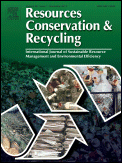
RESOURCES CONSERVATION AND RECYCLING
Driving knowledge for effective resource utilization.RESOURCES CONSERVATION AND RECYCLING, published by Elsevier, is an esteemed journal that has been at the forefront of academic discourse since its inception in 1988. Focusing on the critical fields of resource management, recycling, and sustainability, this journal has established itself as a leading platform for innovative research, holding a prestigious position in the Q1 quartile for both Economics and Econometrics, and Waste Management and Disposal. With a remarkable Scopus ranking of #4 in its respective categories, it represents the pinnacle of scholarly contributions, aimed at fostering knowledge that drives efficient resource utilization and effective waste management practices. The journal's commitment to advancing the understanding of economic implications and environmental impacts of resource conservation is reflected in its diverse array of articles, case studies, and reviews. Although it is not an open-access journal, the valuable insights it offers are essential for researchers, professionals, and students who are dedicated to addressing pressing environmental challenges and enhancing sustainable practices on a global scale.
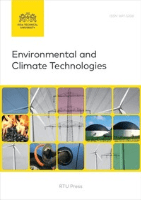
Environmental and Climate Technologies
Advancing Sustainable Solutions for a Greener Tomorrow.Environmental and Climate Technologies is a premier open-access journal dedicated to advancing knowledge in the fields of environmental science and renewable energy. Published by SCIENDO since 2009, this journal plays a crucial role in disseminating innovative research and interdisciplinary studies that address the pressing challenges posed by climate change and sustainable development. With its current positioning in the Q2 quartile for Environmental Science (miscellaneous) and Q3 for Renewable Energy, Sustainability and the Environment, it is recognized for its significant contributions to the academic community, ranking #107 out of 233 in General Environmental Science and #161 out of 270 in Renewable Energy. Hailing from Germany and operating under an open-access policy, Environmental and Climate Technologies ensures that research remains accessible to a global audience, fostering collaboration and discussion among researchers, professionals, and students alike. The journal invites rigorous scientific inquiries and practical solutions that can mitigate the impact of climate-related issues, making it a vital resource for those committed to environmental stewardship and sustainability.

HARVARD ENVIRONMENTAL LAW REVIEW
Chronicling the Evolution of Environmental JurisprudenceHarvard Environmental Law Review, issued by Harvard Law School, stands as a pivotal academic journal devoted to the intersection of environmental law and policy, offering critical insights since its establishment in 1979. With an ISSN of 0147-8257, this journal rigorously addresses contemporary challenges through scholarly articles, case studies, and reviews, thus fostering a rich dialogue among researchers, practitioners, and students alike. Although not an open-access journal, it remains influential, evidenced by its Scopus rankings which position it within the 68th percentile in Law and 35th percentile in Environmental Science categories. Moreover, its classification into the Q4 quartile in Environmental Science (miscellaneous) and Q3 quartile in Law reflects its critical role in advancing knowledge and discourse in both fields. With comprehensive coverage from 1979 to 2023, the journal continues to be indispensable for those seeking to navigate the complex terrain of environmental legislation and policies, underscoring its relevance in scholarly and practical realms.

International Journal of Environmental Science and Technology
Leading the charge in sustainable technology research.International Journal of Environmental Science and Technology, published by SPRINGER, stands as a premier platform for the dissemination of cutting-edge research in the fields of environmental science, technology, and engineering. With an impressive scope spanning from 2005 to 2024, this journal serves as a vital resource for academic and professional communities engaged in tackling pressing environmental challenges. It boasts a strong reputation, evidenced by its Q1 ranking in Agricultural and Biological Sciences and solid placements in Environmental Chemistry and Engineering. Researchers searching for high-impact studies will find the journal's contributions significant, as reflected in its rankings within Scopus: 34th percentile in Agricultural and Biological Sciences and notable standings in Environmental Engineering and Chemistry. Although the journal is not currently an Open Access resource, it maintains a commitment to academic rigor and innovation, making it indispensable for those devoted to advancing knowledge in environmental sustainability and technology.

Green Energy & Environment
Championing Open Access Research for Environmental Progress.Green Energy & Environment, published by KEAI PUBLISHING LTD, stands as a pioneering journal dedicated to the dynamic fields of renewable energy, sustainability, and environmental science. With its ISSN 2096-2797 and E-ISSN 2468-0257, this Q1 journal holds a noteworthy presence in academic discourse, reflecting its high-quality contributions within these critical areas of research. Launched in 2016, it has consistently embraced an Open Access model, facilitating unhindered access to research findings and fostering collaboration across global communities. Based in Beijing, China, this journal is dedicated to disseminating innovative insights that are essential for addressing urgent global challenges related to energy and environmental sustainability. Researchers, professionals, and students alike benefit from a platform that not only showcases pioneering research but also encourages interdisciplinary dialogue and knowledge exchange in the pursuit of a sustainable future.
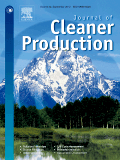
Journal of Cleaner Production
Transforming Industries Through Cleaner Production InsightsThe Journal of Cleaner Production, published by Elsevier Science Ltd, is a leading interdisciplinary journal dedicated to the development and dissemination of knowledge on environmental sustainability and cleaner production practices. With an impact factor that reflects its high relevance in the field, the journal is recognized as a Q1 publication in key categories including Environmental Science, Industrial and Manufacturing Engineering, Renewable Energy, and Strategy and Management as of 2023. This prestigious journal has been a platform for groundbreaking research since its inception in 1993 and continues to shape the dialogue around sustainable practices in various sectors. Researchers and professionals across disciplines can access its wealth of insights, which are critical for driving the transition towards more sustainable production and consumption models. The journal’s rigorous peer-review process ensures that only high-quality research is published, making it an essential resource for academics, industry leaders, and policymakers committed to advancing cleaner production methodologies.

Frontiers in Environmental Science
Empowering global dialogue on pressing ecological issues.Frontiers in Environmental Science, published by FRONTIERS MEDIA SA, stands as a pivotal platform in the sphere of environmental research, showcasing innovative findings and interdisciplinary studies that address pressing environmental challenges. With an impressive open access policy since its inception in 2013, it enhances accessibility and promotes knowledge dissemination among researchers, practitioners, and students worldwide. The journal, recognized for its contributions with a Q2 ranking in the Environmental Science category and an engaging position within the 65th percentile on Scopus, provides a comprehensive archive of research that is both timely and relevant. Covering diverse topics from climate change to sustainable resource management, it inspires critical dialogue and fosters collaborative efforts to shape a more sustainable future. Based in Lausanne, Switzerland, this journal invites contributions that advance the field and fulfill its objective of bridging science with practical applications, making it an essential resource for anyone committed to the environmental sciences.
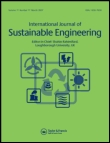
International Journal of Sustainable Engineering
Advancing sustainability through innovative engineering solutions.Welcome to the International Journal of Sustainable Engineering, an esteemed publication within the field of engineering, dedicated to advancing the principles of sustainability in design and technology. Published by Taylor & Francis Ltd, this Open Access journal, available since 2022, provides a platform for high-quality research that addresses the challenges of sustainable engineering across diverse sectors. Based in the United Kingdom, the journal enjoys a distinguished reputation, reflected in its impressive Q1 status in the Engineering (miscellaneous) category and a notable Scopus rank of #35 out of 307, placing it in the top 88th percentile of its field. With a timeline of publications from 2008 to 2024, the International Journal of Sustainable Engineering serves as a vital resource for researchers, professionals, and students seeking to engage with innovative solutions that promote sustainability in engineering practices. We invite you to contribute to this critical discourse and explore the wealth of knowledge presented in our journal.
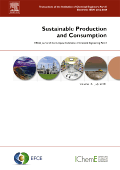
Sustainable Production and Consumption
Transforming Research into Sustainable ActionWelcome to Sustainable Production and Consumption, a premier journal published by Elsevier in the vibrant field of sustainability and environmental science. With an ISSN of 2352-5509, this journal has established itself as a leading platform for innovative research and discourse on sustainable manufacturing, consumption practices, and environmental technologies. As evidenced by its impressive 2023 rankings—Q1 in Environmental Chemistry, Environmental Engineering, Industrial and Manufacturing Engineering, and Renewable Energy, Sustainability and the Environment—the journal ranks among the top tier of its field. Researchers and professionals alike are invited to explore the journal’s rigorous peer-reviewed articles, which aim to advance the understanding and implementation of sustainable practices across various industries. With a strong commitment to disseminating impactful research, Sustainable Production and Consumption serves as an essential resource for academics, policy makers, and industry leaders seeking to address the challenges of modern environmental sustainability.